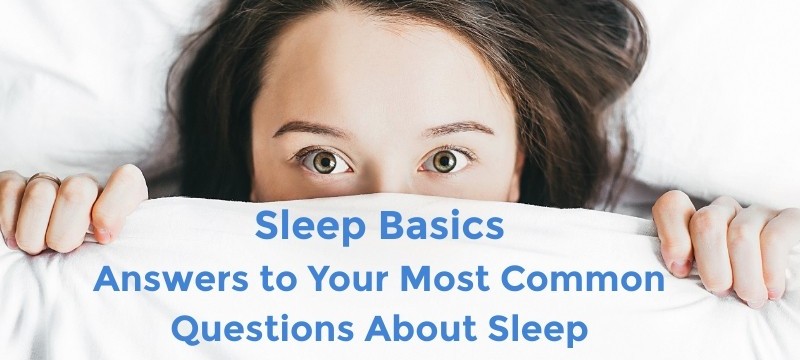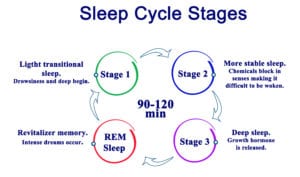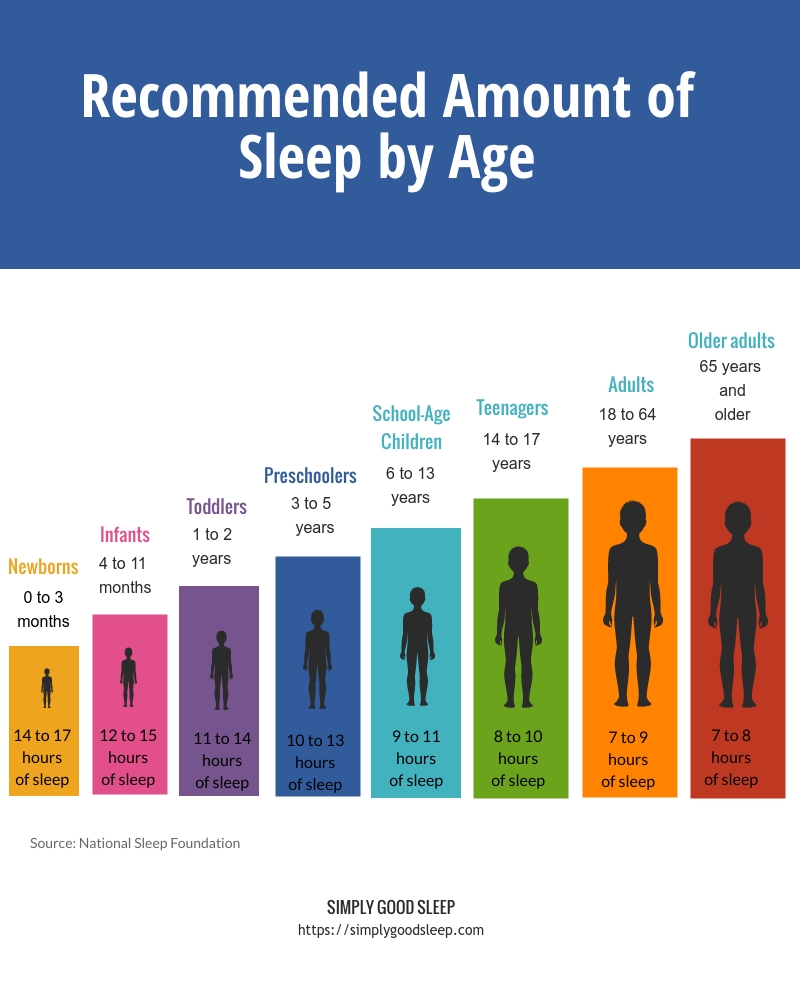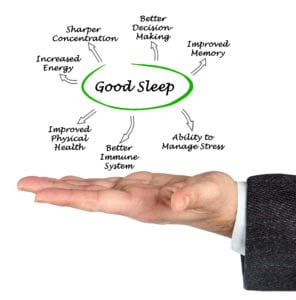
Most of us agree that a good night sleep makes us feel happier, more energetic, and better able to function. We spend a third of our lives sleeping. Like good diet and exercise, sleep is important to our overall physical, mental, and cognitive health and well-being. Here, we answer some of your most common questions about sleep.
Why Do We Need Sleep?
Although sleep is considered a period of relaxation, sleep is actually an active dynamic period focused on strengthening and restoring your body.
It is during sleep when we consolidate our memories, when such information are transferred from short-term memory to long-term memory. It is also the perfect time for our body to regain the energy we lost during the day.
We also need to sleep because it allows us to grow muscle, synthesize and release hormones, and repair tissues. While some people try to get by with little sleep , the reality is that our bodies need sleep in order to survive.
In essence, sleep is a basic human need.
What happens when you sleep?
Sleep is a dynamic sequence of events that follows a regular cyclical pattern, that affects both your physical, mental, and cognitive well-being. Good sleep is often the best way to help you recover from illness and cope with stress.
Sleep is comprised of NREM (Non-Rapid Eye Movement) stages 1, 2, and 3, and REM (Rapid Eye Movement) sleep.

As soon as you fall asleep, you will enter the first stage NREM sleep. As you are only lightly asleep, you can be awoken easily by slight movement or noise. This stage occurs within the first ten minutes of falling asleep.
In the second stage, you do not awaken as easily as in stage 1 sleep. Your heart rate and breathing relax. Your body temperature drops.
During the third stage, you enter deep sleep. During this stage, your muscles are relaxed, your breathing is slower, and tissue repair and growth occurs. Blood pressure drops and hormones are released.
Lastly, you have REM sleep which is marked by dreaming, increased respiration and heart rate, increased brain activity, eye movement, and muscle relaxation. The body is relaxed and immobile.
The sleep cycle begins with non-REM sleep followed by REM sleep. Sleep cycles through these stages approximately 4 or 5 times throughout the night.
How Would You Define Good Sleep?
According to the National Sleep Foundation (NSF), there are indicators that define good sleep, such as the following:
- majority of the time spent in bed is sleeping (more than 85% of the total time)
- falling asleep in less than thirty minutes
- Not waking up or waking up only one time per night
- being awake for less than 20 minutes, if and when we do wake up, during sleep time
How much sleep do we need?
As per the National Sleep Foundation, how much shut-eye we need depends on age.
Newborns (0 to 3 months) need 14 to 17 hours of sleep every day, infants (4 to 11 months) 12 to 15 hours and toddlers (1 to 2 years) 11 to 14 hours.
Preschoolers need (3 to 5 years) 10 to 13 hours of sleep, school-age kids (6 to 13 years) will be okay with 9 to 11 hours of sleep.
Then we have teenagers (14 to 17 years) which need 8 to 10 hours of sleep.
For adults (18 to 64 years) 7 to 9 hours of sleep will be more than enough. However, older adults (65 years and older) will be okay with up to 8 hours of sleep at most.

While sleep needs may vary depending on age, sleep needs are also personal and individual.
Your lifestyle dictates how much sleep you need for the most part.
But the best thing you should do is to sleep at least 7 hours per night. This will help you acquire the right amount of energy and enjoy the day right in front of you!
Reasons Why You Need to get Enough Good Sleep
Like eating and being physically active, getting a good night sleep is important to your physical, mental, emotional, and cognitive well-being.
Good Sleep Makes It Easier to learn and to remember
If you don’t have enough good sleep, you start forgetting stuff. It’s harder to file away the things you want to remember from short-term memory to long-term memory.
Good Sleep Makes You Think Clearly and Make Better Judgment
Getting enough good sleep helps your focus, concentration, and decision-making during important tasks, such as while driving, while at work, or while operating machinery.
Good Sleep May Help Prevent You from Gaining Weight
Lack of good sleep may make you crave high-fat, high-sugar foods and lead to weight gain.
Good Sleep May Help You Ward Off Diabetes 
When you do not sleep much, your body may not use blood sugar as well as it should, possibly raising over time your chances of getting diabetes.
Good Sleep Can Keep Anxiety and Depression at Bay
Just one night of not getting good sleep can make you sad, stressed, and tired. Not getting enough good sleep over time can lead to depression or anxiety.
Good Sleep Promotes A Healthier Heart
Sleeping poorly and less than six hours a night, have been associated with hardening of the arteries, and heart disease.
Good Sleep Can Prevent You from Getting Sick
If you are not getting enough good sleep, you are likely to get sick from an infection and may also take longer to get better.
Good Sleep Could Help You Live a Longer Healthy Life
Sleeping less than 5 hours a night, may impact your ability to live a longer and healthy life.
Sleeping at least 7 hours per night is mandatory if you want to live a healthy, longer life. Go ahead and create a proper sleep schedule and stick to it every night!
How can I sleep better at night?
Make Sleep a Priority. Begin by assessing your own individual habits. Practice good sleep hygiene tips, such as the following:
1. Make and stick to a schedule. Go to bed at night and get up in the morning at the same time daily, even on weekends.
2. Engage in a daily routine exercise.
3. Evaluate your bedroom to optimize temperature, sound and light.
 4. Sleep on a comfortable bed, mattress, pillow, and bedding.
4. Sleep on a comfortable bed, mattress, pillow, and bedding.
5. Minimize or avoid alcohol and caffeine.
6. Refrain from using electronics, such as cell-phones, tablets, and television, before bed.
7. Do something relaxing near bedtime, such as reading a book, meditating, or yoga.
8. Keep a sleep diary. Track your sleep habits over a two-week period.
If your sleep is not better – in terms of quantity and quality – through good sleep hygiene, consult your physician. Bring your sleep diary. Carry with you a list of prescription medications, over-the-counter products, and recreational drugs (for example, alcohol, caffeine), you may be taking.
Final words
Sleep is important to your overall health and wellness.
Prioritize sleep in your daily routine. Remember to schedule sleep like any other daily activity.
Practice good sleep hygiene, and get the sleep you need.

2 Responses
This was so interesting! I had no idea that during sleep we consolidate our short term memories to long term ones. I think sleep really affects your memory function in general – when I lose sleep, I can’t remember things well at all!
I think the amount of sleep per age group is really cool to know too, it’s interesting that the oldest people don’t need as much sleep, I would have thought that perhaps since they were old (over 65) that they needed extra sleep.
The stages of sleep are important, I know I am in the REM stage a lot, I seem to remember a lot of dreams, I’m just afraid that I don’t get enough Stage 3 sleep, but this has shed light on that and now I’m gonna try to monitor it so I can be sure I’m hitting all the stages normally 🙂
We’re glad you found the article interesting and helpful!
Sleep plays a role forming and maintaining the pathways in your brain that enable you to learn, remember, consolidate and retain information over the long term.
Interestingly, older adults need about the same amount of sleep as younger adults, about 7 to 9 hours of sleep nightly. Unfortunately, many older adults often get less sleep than they need. They often have more trouble falling asleep, sleep less, sleep lighter, and wake up more often throughout the night.
Non-REM and REM sleep stages cycle several times while you sleep at night. Getting enough quality sleep is important for your health.
Prioritize sleep and practise good sleep hygiene for good overall health and well-being!